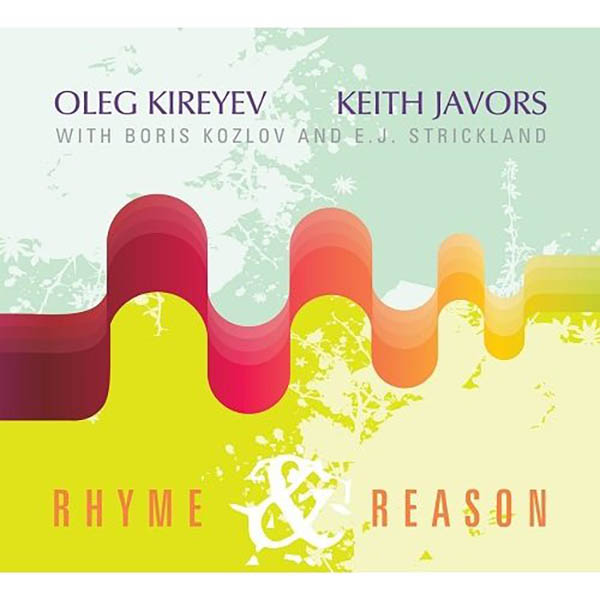
by Ian Mann
June 11, 2010
/ ALBUM
An enjoyable album that bridges the mainstream/contemporary divide with aplomb.
Oleg Kireyev and Keith Javors
“Rhyme & Reason”
(Inarhyme Records 1003)
Oleg Kireyev is a Russian tenor saxophonist now resident in the USA. In a career dating back well over twenty years Kireyev has also lived and worked in Poland and in the English Midlands. During his time in England I saw Kireyev play live several times in the company of local trios such as those of pianist Keith Bill and drummer John Gibbon. Based in Birmingham at that time Kireyev even played a couple of gigs at the tiny Blue Note bar in my home town of Leominster. His repertoire in those days largely consisted of extended workouts on jazz and bebop standards plus a saxophone/vocal set piece that emphasised his Russian origins. His performances were never less than entertaining and a performance at The Red Lion in Wordsley with the Keith Bill Trio in December 2001 is immortalised on CD under the title “A British Concert”, a disc that still lurks somewhere in my collection. There are now several other albums in the Kireyev discography too, mostly recorded back home in Russia.
Since moving to the States Kireyev’s playing and composing seem to have developed considerably.
He has acquired a sympathetic collaborator in the form of pianist/composer/educator/producer Keith Javors and the pair have undertaken two American and two European tours. “Rhyme & Reason” is released on Javors’ own label and teams the duo with bassist Boris Kozlov of the Mingus Big Band and a former collaborator of Kireyev’s, plus leading drummer E.J. Strickland from Ravi Coltrane’s band.
Composing credits are shared equally between Kireyev and Javors and the six lengthy pieces give the group plenty of room to stretch out, rather like Kireyev used to do in his UK days. However the use of original material and the presence of a higher standard of accompanist ensure that this is a stronger, more focussed set than Kireyev’s UK recording.
The new album kicks off with Javors’ title track which he describes as “a shuffle in an Art Blakey vein and a more progressive ‘4’ section”. It certainly swings prodigiously and contains powerful solos from the co-leaders and features for both bass and drums.
Also from the pen of Javors’ “Sierra Nicole’s Bossa” adds a Latin element to the proceedings with Kireyev adopting a softer, breathier tone. Kozlov contributes a brilliant solo fairly early on and both Kireyev and Javors continue to impress on this pretty tune.
Kireyev’s first offering with the pen is “Springtime” which opens unexpectedly with the group exploring free jazz territory with Kozlov on arco bass. After a couple of minutes the bassist puts down the bow and instigates a mighty bass riff that forms the framework of the tune. As the liner notes state there’s something Mingus like about the piece and Kireyev’s powerful solo certainly grabs the attention as he blows hard above the inventive, dynamic drumming of the excellent Strickland. Also powered by Strickland Javors’ solo is a headlong rush and the drummer himself features with a series of sizzling breaks. This is wildly exciting stuff and the piece must be something of a live favourite I would imagine.
Javors’ “Happenstance” is more scholarly and considered and sees the pianist making good use of space and soloing inventively. He’s very good throughout the album and has garnered considerable critical acclaim for some of his other recordings, among them “Coming Together” and “Mo’ City Jungle” on which “Sierra Nicole’s Bossa” first appeared.
“Happenstance” is a trio feature that also includes brilliant features from Kozlov and Strickland as the piece gathers momentum, not only is the piece harmonically adventurous but it also builds up a fair head of steam.
Kireyev’s “What Is Love” is an extended ballad feature that opens up with Javors’ beautiful solo piano before Kireyev’s warm breathy tenor takes over for a lengthy, thoroughly beguiling solo. Javors solos in relaxed manner above Kozlov’s resonant bass walk, the pianist introducing hints of blues and gospel influences in to his playing. It’s then back to the composer for another long draught of smoky tenor before the now customary feature for Kozlov.
If “What Is Love” illustrates Kireyev’s brooding, sensitive side then his closing “Chinatown” represents the ebullient figure I remember from his live performances. Inspired by a Chinese tea room in Moscow that Kireyev used to frequent this high energy piece is described in the liner notes as a “jam tune”. With a catchy hook and an infectious shuffle rhythm it’s the perfect vehicle for everybody to stretch out, have a blow and most importantly have fun. It certainly ends the album on an up note and features exuberant playing from all four members of the quartet. Javors’ rollicking solo is particularly impressive but everybody features strongly on this real rip-roarer of a tune, surely another item destined to be a live favourite.
In some ways “Rhyme & Reason” is very much an “old school” kind of an album but the vitality of the performances gives it an agreeably contemporary edge and there is much to enjoy here. After losing track of Oleg for several years it’s good to rediscover him and find that he’s playing (and writing) better than ever. His three colleagues are all new to me and I was hugely impressed by all of them. There are no great surprises here but this is an enjoyable album that bridges the mainstream/contemporary divide with aplomb.
blog comments powered by Disqus